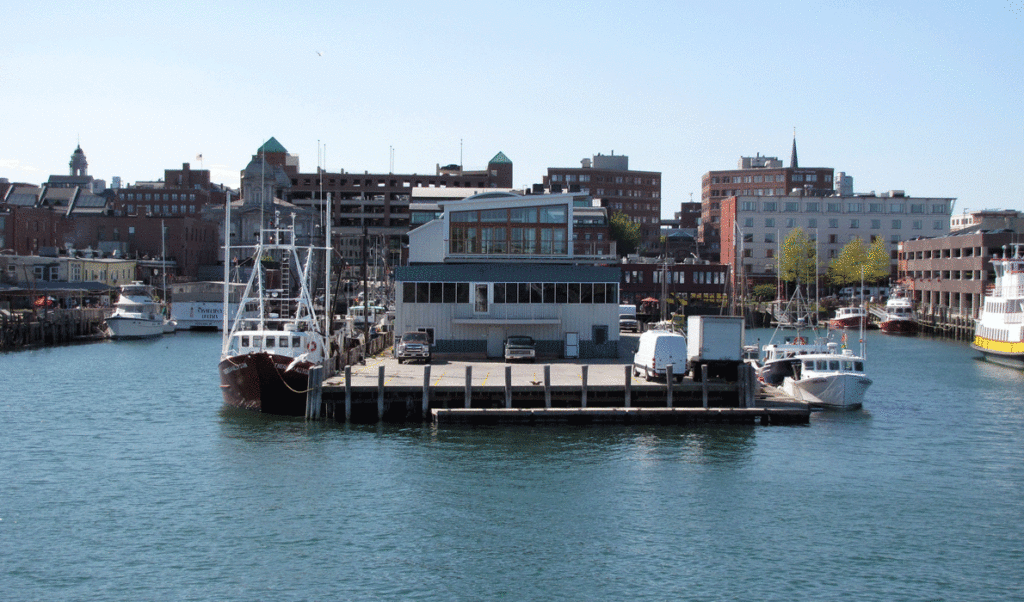By Susan Olcott
Two developments planned for the peninsula part of Portland will add 180,000-square-feet of office space—and more parking pressure.
An Oct. 17 business breakfast forum hosted by the Portland Press Herald used the developments as a jumping off point for a wide-ranging discussion about parking and traffic pressures.
Wex, a payment processing company, will build a 10,000-square-foot headquarters across from the Ocean Gate cruise ship terminal. The company, which now employs over 1,000 in South Portland, will be relocating 400 to the new facility.
Vets Choice, another Maine-based company that provides technology-enabled healthcare services for veterinary practitioners,is building a new 170,000-square-foot facility on the eastern waterfront. The project will include specialty pharmacies as well as a science, technology, engineering, and math center.
Parking in Portland, most would agree, is already tight. While Wex and Vets Choice are constructing their own parking spaces and providing shuttle service from remote lots, there still is a shortage on the peninsula both for people working there and for visitors.
The panel gathered at the Portland Public Library included Sam LeGeyt, a commercial real estate broker with NAI Dunham; Jennifer Small, a broker at Malone Commercial Brokers; Nate Stevens, a broker at CBRE, a subsidiary of The Boulos Company; and Drew Anderson, a partner attorney at Murray Plumb & Murray.
Stevens noted that he currently pays $180 each month for parking.
“An analysis of the cost for construction of new parking facilities shows that those spots have to generate $250 per month to justify being built,” he said. “We’re getting awfully close to that, so we may see some new (parking) facilities coming online.”
But Anderson countered that it may be too late.
“When these two projects are built, forget it,” he said. “I think we’ve missed the boat in planning for this. A lot has to be done fairly quickly. But unfortunately, we may have to suffer for a little while before we have a solution. Municipal solutions take time.”
The need for a solution soon applies to traffic as well.
“We won’t slide down India Street anyone, that’s for sure,” said Small.
Stevens pointed to a 2017 study of downtown parking and traffic issues that offered creative solutions.
“It was a pretty insightful report but the conclusions were very unpopular—ideas like ride shares, and public transit. Those are behavioral changes that are difficult for people to take,” he said.
Audience member Amy Geran of Portland Downtown, a partner in the study, added that one fix the city is working on is a multimodal campaign to make people aware of other transportation options. The study will come out this winter or early spring.
Anderson predicted market-based solutions may emerge.
“Driving is a privilege,” he said. “Eventually, we are going to pay dearly for that. Bigger cities are already dealing with it and we will have to eventually, too.”
He added, “Maybe we could treat it like health care where we give workers a supplement to their salary for opting out.”
Other ideas emerged during the question and answer period.
Paul Lusty, a captain for Sea Tow ferry service, noted that traffic on the Casco Bay Lines ferries has increased, further exacerbating parking.
“We take a tremendous amount of contractors to the islands at this time of year,” he said. “Where are people going to the islands going to park?” Another audience member asked if sea level rise was being considered in the new construction.
Stevens referred to a study the city is undertaking along Marginal Way near the Whole Foods store to assess the impacts of sea level rise. The store parking lot has flooded during high tide in some storms.
Panelists were asked what lies ahead.
LeGyt said he expects to see the Libbytown and West Bayside neighborhoods to be further developed and hopes to see the necessary behavioral changes to alleviate parking and traffic issues.
Small added that high parking fees could cause businesses to consider leaving.





